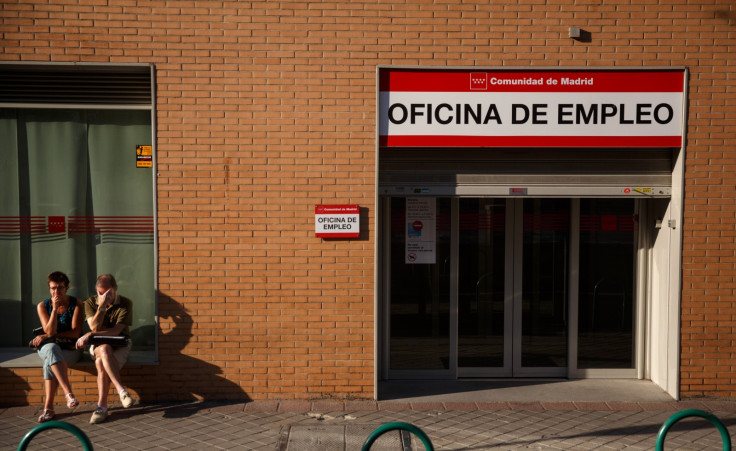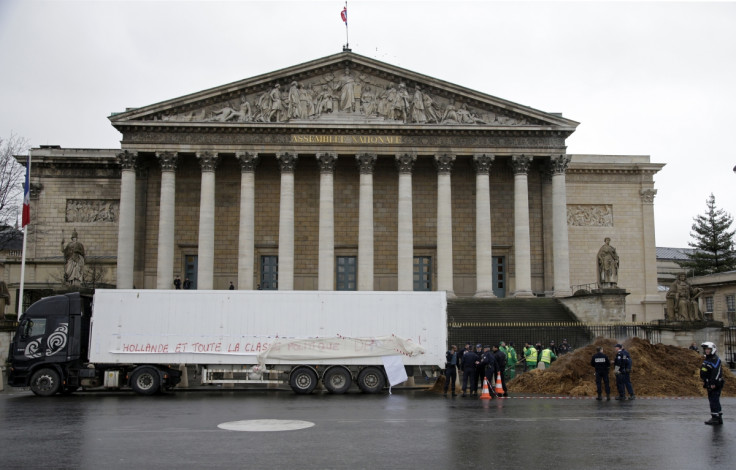Simon Heffer: France's Economy Has Been Splattered, and Front National is Feasting on the Carcass
We are used to hearing about the economic horrors in southern European countries, notably Greece, that have come as a consequence of the European Central Bank's German-inspired austerity programme.

Greece came within an inch of having to default on its debts and of leaving the eurozone. Spain has 60% unemployment among the under-25s, Italy 40%. Portugal and, further north, Ireland have only kept up with the eurozone by making the severest cuts to their budgets, and weathering a period of serious economic stagnation.
But another country, with an economy 11 times the size of Greece's, is in severe trouble, both economically and politically, and is now moving into the spotlight.
When François Hollande campaigned to be president of France in 2012 he said, in a now-infamous comment, that his "true enemy" was high finance. It was indicative of an anti-capitalist policy he would choose to inflict on a country already suffering the effects of sclerosis and over-regulation. Now exactly halfway through his five-year term, the effect of Hollande's assault on what his comrades sneeringly termed "Anglo-Saxon economics" is plain for all to see.
In economic terms the damage has hobbled a large section of French society. Unemployment is now 3.43 million, or over 12%. The country's debt is 95.3% of GDP. Growth is non-existent. The government's deficit reduction plans have failed, with the result that the outgoing European Commission has rejected France's new budget.
To recite these facts – and they are facts, not assertions – is to invite the defensive comment by Hollande's supporters that it is "French-bashing". It isn't, because France's neighbours and partners have no interest in bashing the country. All those who discuss the present state of the French economy seek to do is to demonstrate what has gone wrong and, perhaps, to indicate how it might be put right.
But the mistakes made by the Hollande administration are so profound, and were so predictable, that there is a strong element of humiliation in admitting them: it is as if the country had walked out slowly in front of a high-speed juggernaut and is now wondering why it has been splattered all over the road.
The economic damage has, inevitably, brought political difficulties. Hollande's standing in the popularity polls is around 13%, the worst since records began. He is on his third government this year, and this one may not last long. Manuel Valls, his increasingly right-wing prime minister, harangued his party last week and told it to embrace reform or face oblivion. Some of his ministers, who have not woken up and smelled le café, are deeply uncomfortable about this: the spirit of May 1968 still lingers around the French left, even around some of those too young to remember it.

Some former ministers, such as Benoit Hamon, who left the government in the summer, have expressed their outrage in a way destined to split the party deeply. Valls is also widely tipped as the Parti Socialiste's big presidential hopeful for the 2017 contest, with Hollande so widely written off that if he tries to stand for a second term his party is likely to ensure he does not even make it as far as the primary. Never in the history of the Fifth Republic has a chef de l'état failed so comprehensively.
The best thing for France, deep in debt as it is, would be to devalue its currency: but being in the euro, it can't. One of the factors driving the popularity of the Front National, a party hitherto associated with tough anti-immigration rhetoric and branded as racist by its opponents, is that it wants to leave the EU.
A recent opinion poll suggested that Marine Le Pen, the FN's leader, would reach the second round of the 2017 presidential contest, and possibly even win it, a prospect that panicked all other mainstream politicians. But so long as France cannot entirely be master of its financial fate, with an economic policy dictated from Berlin and Frankfurt, the armoury for use against the hard right is strictly limited.
The best thing for France, deep in debt as it is, would be to devalue its currency: but being in the euro, it can't.
France is screaming for structural reforms. A country in which the trades unions remain powerful has to embrace the rules of the global economy, or it will sink. It is preposterously over-regulated, with absurdly high barriers harming entry to many trades and professions, and a 35-hour week still in force. Although its productivity is still superior to many of its competitors, it is not high enough.
High taxation has driven hundreds of thousands of the most talented of French out of the country since 2012, as anyone walking down a street in west London will hear. Taking their wealth with them as well as their entrepreneurial flair, they have seriously impoverished a country that did not cherish them.
If the French government tears itself apart again Hollande may have to dissolve the National Assembly and call elections that force him into a period of cohabitation with the right. It is nearly impossible for him to govern now: it would be completely so if he had to deal with the vicars-on-earth of Nicolas Sarkozy, or even Marine Le Pen. He may yet become only the second president in the Fifth Republic, after Charles de Gaulle in 1969, to feel he has to resign.
Hollande's resignation would be akin to putting a dog out of its misery, except that dogs in that situation are usually deeply loved, and have done far less harm. But it might be the kindest thing for France, which really does have to tear up the map and begin again.
Dr Simon Heffer is a British commentator and author who has written columns for The Daily Mail, The Daily Telegraph, The Spectator and The New Statesman. He is the biographer of Enoch Powell, Thomas Carlyle and Ralph Vaughan Williams and recently published High Minds: The Victorians And The Birth Of Modern Britain.
© Copyright IBTimes 2025. All rights reserved.






















